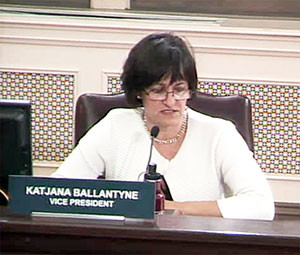
Ward 7 Alderman Katjana Ballantyne and other members of the Board of Alderman have expressed a need for detailed clarification on various provisions of the proposed zoning ordinance changes.
By Jim Clark
City of Somerville officials are continuing their in-depth study and refinement of the proposed new zoning ordinance, seeking clarification from planners as well as soliciting comments and concerns from residents and commercial interests who will be affected.
Although the revised ordinance has been a work in progress for many months, involving numerous meetings and planning sessions, several important questions remain unanswered for those tasked with bringing the matter to its conclusion.
Ward 7 Alderman Katjana Ballantyne brought forward a number of informational requests for the Executive Director of the Office of Strategic Planning and Community Development (OSPCD) to fulfill at the last Regular Meeting of the Board of Alderman on March 26.
Specifically, the Board resolved to formally request that the OSPCD inform them of the number of additional dwelling units allowed under the proposed zoning ordinance. Alderman Ballantyne suggested that assumptions were taken to get to the final document together.
“I think that our SomerVision is wonderful,” said Ballantyne. “It expressed the input from the community and I take it very seriously. Now we have a document that we’re asked to respond to and I find myself asking a lot of big picture questions. Through this review process I think it’s important that we talk about those assumptions in more detail and also talk about the impact in certain areas.”
Ballantyne said that the number one issue she has heard about in the community is affordability, and asking how if housing density is increased, it will affect the infrastructure and finances of the city.
Additionally, the Board further requested the OSPCD to supply information that identifies how the proposed zoning ordinance will affect the zoning of city owned buildings, along with details on an implementation plan for how the new proposed zoning ordinance relates to water and sewer, other infrastructure changes, police and fire personnel capacity, and public safety buildings.
The Board also requested that the city planners and the City Solicitor advise them on whether the proposed zoning ordinance complies with state law regarding the co-habitation of four unrelated adults and how much authority a municipality has in this regard.
Alderman at Large and Board President William A. White Jr. discussed the history of the zoning provision restricting the number of unrelated occupants, which predates the current proposal. “I’ve gotten emails and phone calls where people believe that this is a new zoning provision,” White said. “In other words, it never existed before, and this new zoning restricts four unrelated people. That’s not true. Our existing zoning does that, and even though we have new zoning, a lot of the new zoning incorporates the old zoning, of course. And this is one of the provisions that carry over.” He indicated that it is in compliance with the State law and has been upheld in the US Supreme Court, and that most U.S. cities have similar restrictions in place. “This is something that was enacted many years ago, and it’s legal,” according to Alderman White.
Ward 3 Alderman Robert J. McWatters picked up on the matter saying, “I think there is a misconception out there that this is new, part and parcel of the new zoning. We certainly don’t want absentee landlords to be renting out rooms. That becomes real problematic.” In that regard, he expressed a concern that rooming houses should not be allowed to proliferate throughout the city.
It was also ordered that the OSPCD should discuss with the Board by April 15 a requirement for Institutional Master Plans as part of the proposed zoning ordinance.
Ward 5 Alderman Mark Niedergang addressed the question of whether an independent consultant should be brought in to examine the soundness of the proposed changes. “A number of people have expressed to me in writing that they think we should have outside counsel, so to speak,” Niedergang said, emphasizing that although the abilities of the Planning Department were not in question, having an objective viewpoint could be valuable in the process of finalizing the proposal.
The reports of the OSPCD would be directed to the Board’s Land Use Committee for examination and discussion. The next scheduled meeting for the Committee is scheduled for April 15.
At least one additional public hearing on the proposed zoning changes is to be scheduled for the near future, at which time concerned residents and others will have opportunities to share their ideas and concerns on the proposed ordinance.












Reader Comments